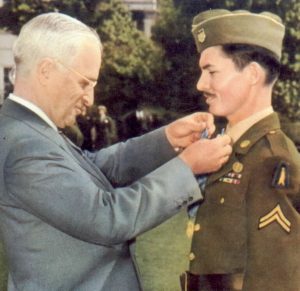It’s tough enough to go into battle with a weapon. Imagine doing so without one! But that’s what Desmond Doss did during WW II. He was a conscientious objector and served as a medic during the Battle of Okinawa. His actions one day saved the lives of 75 of his fellow soldiers.
The account I am reposting below tells Doss’s story as well as that of two other men who won the Congressional Medal of Honor without ever firing a shot in anger. The article was initially posted by War History Online. I hope you enjoy this story about three astonishing soldiers.
Three conscientious objectors were awarded the Medal of Honor – the highest military honor in the US – without ever firing a weapon.
One of those men is Desmond Doss, who shunned the title of conscientious objector. His story was translated to the silver screen in “Hacksaw Ridge,” a 2016 movie directed by Mel Gibson. Andrew Garfield plays Doss, who saved 75 lives in the Battle of Okinawa. Garfield was nominated for a BAFTA for his portrayal of Doss.
The US allowed conscientious objectors during World War II to serve in non-combat roles; most worked as medics in the Army. This enabled them to serve without carrying a weapon. During World War II, more than 70,000 men were designated conscientious objectors, primarily men whose religious beliefs made them opposed to war. Some refused to serve, but 25,000 joined the US armed forces in non-combat roles such as medics and chaplains.
Doss was a Seventh Day Adventist who was drafted in April 1942. After receiving the status of conscientious objector, he enrolled as a medic in the 77th Infantry Division.
Other soldiers harassed Doss, and his commanding officer tried to get him discharged with a Section-8 (meaning he was mentally unfit for service). Doss refused the release stating that he felt he would be a poor Christian if he accepted a discharge that implied he was mentally unstable due to his religion.
In 1944, Doss got his first taste of combat. He served in Guam and Leyte in the Philippines – receiving the Bronze Star for his actions. The movie focuses on Doss’s time in Okinawa. Doss prayed, and then the 77th captured the 400-foot Maeda Escarpment without any deaths and only one minor injury. When asked how they did it, the soldiers replied, “Doss prayed!”
On May 5, the Japanese countered and drove the Americans off the escarpment. Seventy-five injured soldiers were left behind.
Private Doss stayed behind with the wounded. In the constant enemy fire, he treated the injured, carried them to the edge of the escarpment, and lowered them, one at a time, on a litter. He continued his rescue efforts for two weeks without injury. Finally, a grenade sprayed him with shrapnel. Doss continued for five more hours despite his wounds.
The citation on his Medal of Honor gives him credit for saving 75 lives that day. The medal was presented to him by President Harry S Truman on October 12, 1945.

Two conscientious objectors would later receive the same honor during the Vietnam War–Thomas W Bennett and Joseph G LaPointe Jr. Like Doss, both held religious convictions which posed a moral crisis in the face of their call to military service – also choosing to serve as medics on the field. Bennett and LaPointe, however, did not survive their experiences.
Bennett’s platoon was ambushed amid the thick, triple-canopy jungle; everyone dived for cover except Bennett, who rushed to aid the injured. Under near-constant assault, he aided and comforted his wounded comrades over the next day or so; before being shot as he jumped up to dart the 30 feet to an injured platoon, choosing to risk exposing himself to heavy rifle fire.
Joseph G LaPointe was a medical aidman attached to the 101st Airborn Division; his patrol came foul of an enemy bunker while assisting with a combat helicopter assault mission. Hearing the call for aid, LaPointe crawled through enemy fire – in plain view of the bunker – to assist two wounded comrades, shielding them with his own body.
Repeatedly wounded and knocked down, each time, LaPointe would return to his position and continue to administer aid to the two soldiers while shielding them with his body. An exploding enemy grenade killed all three before LaPointe could stabilize them and evacuate them to safety.
Bennett and LaPointe were awarded their Medal of Honours posthumously in 1970 and 1971, respectively. Doss, Bennett, and LaPointe may have found their place in the historical records, but it’s up to us to keep their memory and the memory of their actions alive.
Check out the trailer for Hacksaw Ridge here: https://www.youtube.com/watch?v=8g5mQ69ROvo
[If you enjoyed this post, please consider subscribing to ForeignCorrespondent and tell your friends to subscribe. IT’S FREE! WHAT A DEAL! If you’ve received this from a friend and would like to be added to our distribution list for future blog posts, please enter your email address in the sign up for notifications box on the right rail of this post or at: https://ronaldyatesbooks.com/category/foreign-correspondent You can also find my commentaries on the American Free News Network at https://afnn.us. And please feel free to comment. WE LOVE COMMENTS!]


Another great and informative piece of honest history. Thanks for sharing!
Thanks, Joe. These stories should never be forgotten.